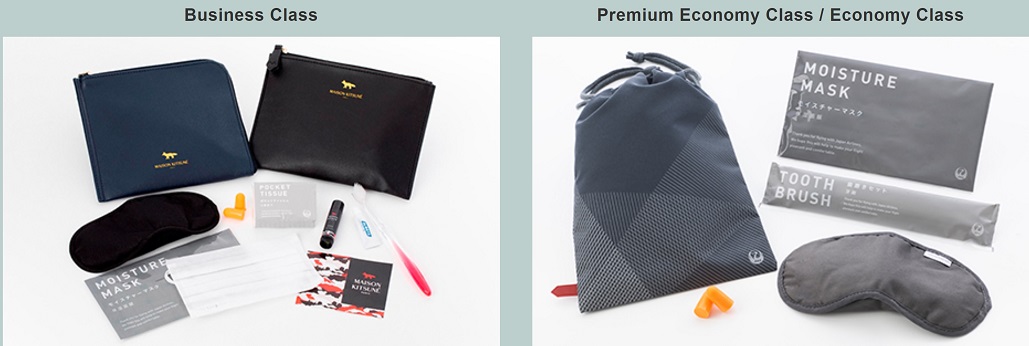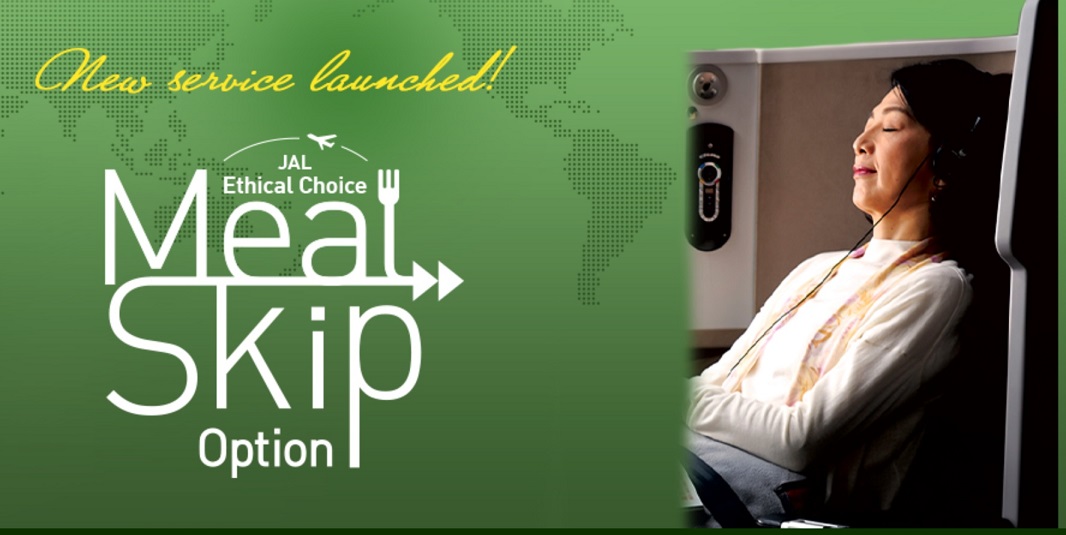Japan Airlines has a new cost-saving measure they’re testing on Bangkok – Tokyo Haneda overnight flights (JL flight 34): letting customers choose in advance to skip meal service in exchange for an amenity kit.
The airline knows that many passengers will skip the meal on a six hour redeye. But they normally board enough food for all passengers, so they do not run out of food. Their approach to lowering the amount of food they purchase and board is to incentivize customers to let them know in advance whether or not they’re going to want a meal. Call it the airline equivalent of ‘make a green choice’ at hotels, which lets the hotel property reduce housekeeping staffing levels.
- Business class customers are offered a long haul business class amenity kit
- Coach and premium economy customers are offered a regional business class amenity kit

It’s even framed in the same narrative language that the hotels use. JAL calls the program Ethical Choice Meal Skip Option.

I suppose it’s ethical of Japan Airlines to save money by reducing food waste, but is it an ethical obligation for the passenger to make their meal decisions at least 25 hours prior to departure, in other words to know whether their future self is going to be hungry? At scale wouldn’t this just shift demand for food from JAL to other vendors, whether grocery stores to people eat at home or perhaps airport restaurants and therefore shift the locus of uncertainty?
From experience, we found that a number of customers prefer to skip the meal service [on red-eye flights from Southeast Asia], which results in food waste. We will continue to review customer feedback and may decide to expand the service in the near future.
The Bangkok to Tokyo Haneda route was selected as we operate six flights each week and departs past midnight. Therefore, it served as an ideal route to conduct the trial.
The business class amenity kits aren’t so good that they are worth trading a meal for if you’re hungry, or getting you to buy a meal at the airport instead of eating on board. Instead they’re a minor token that encourages someone who knows they aren’t going to want to eat on an overnight flight to reveal their preference to the airline in advance. That’s useful. And amenity kits are shelf stable. This is an interesting trial, we’ll see if it extends to other flights and beyond redeyes – and whether it foretells a reduction in overall meal service on intra-Asia service.


Ok, this seems truly idiotic. In addition to the point you make about not necessarily knowing if yuo’ll be hungry, trading food waste for low value amenity kits that are primarily made of non degradable plastics that will collect dust in a drawer before ending up in a landfill. I’d rather have a paltry number of frequent flyer points even 500 than an amenity kit.
I agree with @johhny, they should have opted for awarding points instead of “environmentally bad” amenity kits.
Atleast the hotels *used to* award points for making a green choice
Love this idea.
Sorry, most people pretty much know that they don’t want to be eating at midnight anyway (unless you’re connecting from another long haul flight that didn’t feed you). Actually, you SHOULDN’T be eating at midnight. But you’re on an airplane, and someone is offering you free food, so you take it anyway rather than trying to get some sleep.
Now, you can just go straight to bed with no remorse (and a better eyeshade over your eyes).
The biggest challenge with this trial is informing the pax of this option. I get that the 25 hours advance notice is a pain but that is mostly due to requirements from the caterers.
Now if this refers to a breakfast before landing, well then ignore what I said, because I definitely would need to eat breakfast, even if it’s on an airplane.